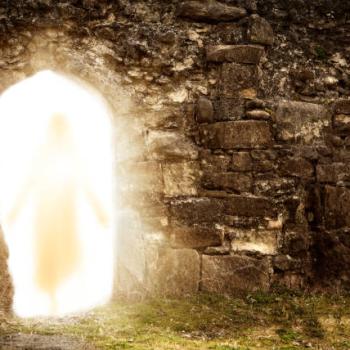
There’s a lot of talk about the United States being a Christian nation, but what does that really mean? James Madison, one of the Founding Fathers, wrote a letter in 1803, objecting to the use of government land for churches:
“The purpose of separation of church and state is to keep forever from these shores the ceaseless strife that has soaked the soil of Europe in blood for centuries.”
It seems clear, then, that at least one of the Founding Fathers was anxious to keep religion and the church out of government. For Madison, this was part of the core identity of the Republic. Catholics and Protestants had fought and killed each other for centuries in Europe, using the power of government to impose their religious beliefs, and the U.S. was a brave, unique attempt to establish something better.
I’ve always admired the vision of the Founding Fathers and cannot help but feel that modern expressions of Christian Nationalism are a betrayal of all they intended the United States to be.
Thomas Jefferson had much to say about separation of church and state too:
“I contemplate with sovereign reverence that act of the whole American people which declared that their legislature should ‘make no law respecting an establishment of religion, or prohibiting the free exercise thereof,’ thus building a wall of separation between Church & State.” (Jefferson to Danbury Baptists, January 1, 1802)
Jefferson was an Enlightenment rationalist, believing that reason should govern all areas of life, including religion. Perhaps the most intense battle of Jefferson’s life was tackling religious strife in Virginia, leading to the adoption of the Virginia Statute for Religious Freedom in 1786.
Before the Revolution, Virginia had a formally appointed church – the Church of England – who heavily persecuted Presbyterians and Baptists among other faith groups. This was a source of great distress for Jefferson, who fought long and hard for religious freedom until the Virginia Statute for Religious Freedom was finally adopted in 1786. So important was the adoption of this bill that he listed it among his three greatest achievements (the other two being the Declaration of Independence and the founding of the University of Virginia) and asked that it to be inscribed on any grave marker raised in his honor. (Jefferson, Autobiography (1821), Ford 1:53.)
The Virginia Statute for Religious Freedom was originally known as Bill 82 and was promoted by James Madison while Jefferson waited anxiously in Paris, where he was serving in an official U.S. government capacity. The text of this important bill is worth looking at in more detail:
“Almighty God hath created the mind free, that all attempts to influence it by temporal punishments, or burthens, or by civil incapacitations, tend only to beget habits of hypocrisy and meanness, and are a departure from the plan of the holy author of our religion, who being lord both of body and mind, yet chose not to propagate it by coercions on either, as was in his Almighty power to do.”
In other words – God doesn’t force us to hold specific beliefs, and neither should the government through political pressure.
“…that the impious presumption of legislators and rulers, civil as well as ecclesiastical, who, being themselves but fallible and uninspired men, have assumed dominion over the faith of others, setting up their own opinions and modes of thinking as the only true and infallible, and as such endeavoring to impose them on others, hath established and maintained false religions over the greatest part of the world and through all time: That to compel a man to furnish contributions of money for the propagation of opinions which he disbelieves is sinful and tyrannical.”
In short, this is stating two things – firstly, that nobody should claim to have the only infallible faith, or to assume that its infallibility means it can reign supreme over other beliefs. Secondly, that the use of taxation to fund or support a favoured religious institution is tyrannical and sinful.
It seems clear then, that the idea of Christian Nationalism, which clearly favours one religion over all others, is an affront to the very principles the Founding Fathers held dearest.
The Pledge of Allegiance has been altered for political purposes
The Pledge of Allegiance is not what most people think it is. Originally penned in August 1892 by the socialist minister Francis Bellamy, it was published in The Youth's Companion with the intention that it would be used by citizens in any country rather than specifically the United States. Any notion, therefore, that the words of the pledge are fundamentally about the United States is false. It was meant to be a unifying declaration that brought all people together, regardless of political or religious affiliation. (ushistory.org, July 4, 1995)
In fact, the original pledge made no mention of God at all:
"I pledge allegiance to my Flag and the Republic for which it stands, one nation, indivisible, with liberty and justice for all."
In 1954, in response to the Communist threat of the times (i.e., to serve a political agenda), President Eisenhower encouraged Congress to add the words "under God," creating the pledge recited today:
"I pledge allegiance to the flag of the United States of America, and to the republic for which it stands, one nation under God, indivisible, with liberty and justice for all."
I strongly suspect that most United States citizens are unaware that this was a relatively recent alteration, even though it fundamentally undermines the original intention of the pledge. The addition of "under God" gives the false impression that the United States is a Christian nation with a shared faith – an idea used to justify the overlooking of minorities, people of other faiths, and atheists to this day.
Surely the interdenominational battles which led the Founding Fathers to legislate for freedom of religion applies just as much to the multiple faiths, agnostics, and atheists who make up at least 32% of the U.S. population today. It is insane to think that freedom of religion only applies within Christendom. The heart of freedom of religion is liberty, rather than the enforcement of dogma.
Personally, I think the original pledge is beautiful, emphasizing unity in the Republic regardless of creed or political affiliation, and liberty and justice FOR ALL – not just for Christians and capitalists. The original ideals of the United States are beautiful too, perhaps even exceptional. The Founding Fathers freed themselves from Christian nationalism and tyranny, and established a set of principles by which the country could flourish. The narrow vision of Christian Nationalism driving the religious right today is a shriveled prune compared to the original, nourishing fruit of a great nation.
What did Jesus teach about Christian nationalism?
This is surely the most important question we need to ask to understand the role Christianity should play in a government context. When Jesus was arrested in Gethsemane, Peter attacked the high priest’s servant, cutting off his ear, but Jesus rebuked him. Matthew 26:52-53,
‘Put your sword back in its place,’ Jesus said to him, ‘for all who draw the sword will die by the sword. Do you think I cannot call on my Father, and he will at once put at my disposal more than twelve legions of angels?’
Jesus’ motivation for abstaining from the use of force became clearer when he stood before Pilate. John 18:36,
Jesus said, ‘My kingdom is not of this world. If it were, my servants would fight to prevent my arrest by the Jewish leaders. But now my kingdom is from another place.’
The first statement shows that Jesus chose not to call on force. Violence and coercion cannot bring about the Kingdom of God – it was the surrendering of power rather than the seizing of it that ushered in the New Covenant.
The second statement makes it clear that the Kingdom of God is not of this world. It cannot be established or expanded through force, as Earthly kingdoms are. Today, we see Christian groups in the U.S. trying to enforce what they erroneously think is the Kingdom of God (and thereby corrupting and falsifying that kingdom) through legislation, politics, and even violence. This couldn’t be more anathema to the nature and principles of Christ.
The stacking of the Supreme Court with right-wing religious zealots was therefore an act of rebellion against God, and according to Thomas Jefferson, the enforcement of religious beliefs (such as the right to life) through legislation is both tyrannical and a sin.
Christian nationalism is not only an offense to the principles of a great nation’s founding principles but an act of rebellion against Jesus. It runs counter to the teachings of Christ and has become an idol, replacing the risen Lord.
Note from the author: Readers who want to ensure I can continue to write these articles can make a pledge through my Patreon page.
11/15/2024 10:38:40 PM





